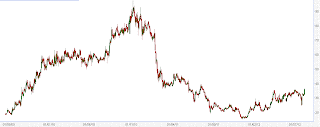Not many would be aware that SpiceJet has had its humble
beginnings as ModiLuft in 1993. In fact, NSE ticker for SpiceJet stock is still
listed as MODLUF. ModiLuft was an Indian JV with Lufthansa and maintained high
standards and created many firsts for Indian aviation sector. However, ModiLuft
brand ceased to exist by 1996 due to JV issues and was renamed as Royal
Airlines. By 2004 it was renamed as SpiceJet with a low cost business operating
model. By 2008, SpiceJet was India’s second largest low cost operator and still
SpiceJet is among the four largest airlines in Indian skies.
Indian Aviation sector was in deep trouble since last couple
of years due to government apathy, rising Jet fuel costs, cut-throat
competition, abysmally low fares and absolute lack of pricing power for all carriers.
There was little service differentiation among various carries, which caused
price as the only determinant for a flyer to make a decision. Airlines competed
solely on price, and fares were as low as INR 100 on some routes, thus driving
airlines into deep losses. Spicejet had five straight quarters of losses. And
then things turned around.
Meanwhile, there were other activities happening in this
sector, carriers such as Deccan Airlines changed hands and others like
Kingfisher have now almost gone bankrupt. Kingfisher is now operating only 10
aircrafts, down from 64 at its peak. Similarly, other carriers such as Indian
Airlines have had employee strikes and operational issue.
Net net, reduced seats availability has caused some good
things for these carriers. Pricing power has returned to this sector and even
Jet fuel costs have sobered down. Tariffs in most sectors are up from 50% to almost
100%. With decline in capacity due to Kingfisher and IA troubles, remaining
carriers such as SpiceJet and Jet airlines, which were operationally robust are
alive and kicking today to see better days.
SpiceJet has reported profit in its latest quarterly result
and currently the stock is almost at a 52 week high. Promoter’s have raised their
stake from 43.5% to 48.5% recently and this demonstrates that they have faith
in future of this brand. Revenues in recent quarter have seen a robust 30%
jump, signaling increased fares and pricing power in hands of carriers.
SpiceJet stock had seen much better days in recent years
with stock touching a high of 93 in Nov, 2010 and since then it has been in a
decline. From recent lows of INR 16, stock has now nearly doubled as we speak.
Technically speaking, stock may hit a near term resistance at this level and
may decline to lower levels. It’s a buy on each decline though.
Rs 40 to Rs 50
would be a trouble zone for this stock, crossing which a quick Rs 60-70 range
is possible. For now, Indian aviation sector is on a roll.
Thanks for reading this blog and keep writing in to us.




No comments:
Post a Comment